Billy Coffey's Blog, page 41
May 7, 2012
The puddle
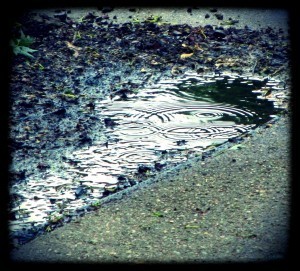
image courtesy of photobucket.com
It was a hard rain, and fast—the sort of pour that early May is known for here. It came from clouds the color of dark smoke that rolled over town like a wave, here and then gone over the mountains. What was left in its wake was the grateful song of a robin from the oak in the backyard, and the sugary smell of wet grass and tilled earth.
And the puddle.
It was not a deep puddle, nor was it wide. Maybe three lengths of my boot and deep enough to reach the second knuckle of my index finger. It lay just beyond the mailbox at the end of the lane, a pothole the rain had converted into a passing mirror of liquid glass.
The mailman had delivered the day’s assortment of junk mail and bills just before the first cracks of thunder. Now that the sun had returned and the robin was singing and that sweetness was in the air, I decided to go check the box. A small boy riding a dirt-road-brown bicycle rounded the corner as I made my way down the lane. He tried a wheelie, barely managing to get the front tire off the ground, then uttered a Yes! as if what he’d just done was almost supernatural.
I gave the puddle a wide berth—I was in blue jeans and flip flops, and didn’t want to risk getting either wet. There are few things in life more irritating than wet cuffs on your blue jeans.
I’d just pulled the mail out of the box (a reminder of the upcoming Book Fair, a ten dollars off coupon for Bed, Bath & Beyond, and the cable bill) when the boy squeezed the brake levels on the handlebars. The bike skidded nearly ten feet on the wet pavement, the last four or five fishtailing, which produced another Yes!, this one whispered.
I looked up. The boy was staring at my feet, where the puddle lay. A soft breeze rippled the surface, and for a moment, however brief, my mind turned to something I’d once heard from an old relative—all mirrors have two sides, she’d said. One side you look at. The other side looks into you.
“That’s a pretty cool puddle,” the boy said to me.
I looked at it and then to him. “Sure is.”
He nodded, and I got the feeling it was the sort of nod that was more the punctuation on the end of a decision rather than an agreement with what I’d just said.
I thought he was going to ride through it. That’s what I would have done at his age. Plus, it would have the added benefit of turning his dirt-road-brown bike back into the red I suspected was underneath. But he didn’t. He threw down the kickstand and dismounted as if from a mighty steed in the Old West.
He walked to me and toed the edges of the puddle.
“You gonna use that?” he asked.
“Nope.”
“Mind if I borry it?”
“You can borrow it all you want.”
He nodded and took three kid-sized steps back. Then he ran forward, leaped, and landed square in the middle of the puddle. Water billowed up over his legs, reaching his waist. He lands with a smile that to me is brighter than the rainbow over us.
“Thanks, mister,” he said. “You can have a go if you want.”
He rode off, a plume of road water trailing behind him. I held the mail in my hand and tried to remember the last time I jumped into a puddle in the road after a May rainstorm. Years, probably. Probably long ago, back when I had my own dirt-road-brown bike.
Puddles aren’t adult things. Adults avoid them. They splash and make a mess and get the cuffs of your jeans wet. It isn’t responsible or mature.
Maybe. But then there’s that mirror inside each of us. The one we look into that shows us who we are, and the one that looks into us and shows us who we should be.
I won’t tell you if I jumped or not. Some things need to stay secret. But I will say this—I can’t wait for it to rain again.
Share and Enjoy:

May 3, 2012
Calling all angels
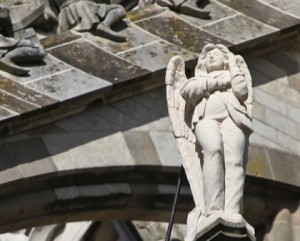 In the village of ‘s-Hertogenbosch in the Netherlands, there is a cathedral. Atop the spires and colonnades are statues of saints and angels, many of which are smiling faintly, as if they know all the answers to all the mysteries that vex us so.
In the village of ‘s-Hertogenbosch in the Netherlands, there is a cathedral. Atop the spires and colonnades are statues of saints and angels, many of which are smiling faintly, as if they know all the answers to all the mysteries that vex us so.
One angel in particular has caused something of a stir in that small village. The newest one, erected only last April. Whereas all of its counterparts are garbed in the traditional flowing robes and wings, this one has been modernized with jeans, a laptop, and a cell phone.
It’s the cell phone that captured the attention of one particular husband and wife in the village. The wife especially. So much so, in fact, that she set up a number so people can call the angel. Sort of a heavenly lifeline.
The church, of course, frowned on such a development. They didn’t think it appropriate for anyone to be playing an angel. In their wisdom, however, the bishops decided to let things be. A good thing, that. Because now upwards of thirty people a day dial the angel’s number, and each are greeted by the voice of a very normal and very anonymous Dutch housewife who says, “Hello, this is the little angel.”
It’s all become somewhat of a phenomenon. The angel even now has his own Twitter account (@ut_engelke). Calls come from all sorts of people in all walks of life—old and young, rich and poor, happy and sad. Recently, a little girl called the angel for prayers for her dead grandmother. A widow called for prayers for her dead grandchildren.
The angel (I suppose that should be “angel”) answers them all. She listens. I doubt if much advice is given, but I have no doubt that’s a good thing. When people are hurting, what they need isn’t advice, it’s an ear to whisper into and a shoulder to lean upon.
I read about all of this the other day. It stuck in me. Not so much like a nagging pain. More like an itch you get deep in your ear that can’t be scratched. I couldn’t define that itch then. I think I can now.
What struck me wasn’t so much that somewhere in the Netherlands there exists a statue of an angel wearing jeans and holding a cell phone. Not even that in a tiny village there lives a woman who is now heaven’s answering service. No, what struck me was the number of people every day who call a number they know doesn’t point heavenward to speak to someone they know isn’t an angel, for no other reason than that they are hurting.
That they need help.
That, my friend, is a powerful thing.
I’ve long believed that joy is an individual thing; what makes me happy, what brings me peace and laughter, might not be what would bring those things to you. But when it comes to what makes us hurt, what makes us afraid, what keeps us up at night staring at a vacant ceiling, those things are the same. Maybe not exactly, but close enough.
Our hurts unite us.
They define us.
They make us not only human, but a family.
And if that’s the case, maybe we could all be angels, too.
Share and Enjoy:

April 30, 2012
Waiting for applause
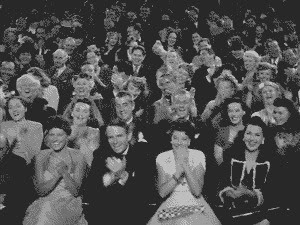
image courtesy of photobucket.com
The other day my wife found a notebook tucked beneath a pile of kindergarten papers and rainy day projects. It was my daughter’s. Her first notebook, as a matter of fact. With chewed corners and squiggly lines instead of sentences.
She’s a chip off the old block, my little girl—equal parts bookworm, nerd, dreamer, and writer. That last bit has taken hold over the last few years. She wants to be a writer, just like her daddy. I’m good with this.
This past week, she had the honor of attending a gathering of county elementary school students known as Young Authors, which included a genuine flesh-and-blood children’s writer. Maybe even cooler than that, each student had to write his or her own story that would be read during the event.
This was big stuff. Important stuff.
My daughter worked for three weeks on her story. She wrote and rewrote, edited and cut, pasted and revised. And fretted. There was a lot of fretting. That’s when I figured she was closer to becoming a real writer than I’d thought. The result was nearly seven hundred words concerning a Middle Ages princess who found herself in very deep trouble.
I wasn’t there when she read it, but I received the blow-by-blow later that evening between sniffles and those wet, whispery hiccups young girls tend to develop in the midst of an emotional breakdown.
It wasn’t because she faltered while reciting her story, nor was the story itself horrible (on the contrary, I was quite smitten with it). No, it was something else. Something much, much worse.
No one applauded at the end.
That no one applauded for any of the other stories offered seemed to me an extremely relevant fact. Not so to her. To her, it didn’t matter at all that none of the other children’s stories was met with adulation. All that mattered was that HERS didn’t.
She was crushed, wholly and completely. Ruined to the point where she vowed to never write a single word again. The simple act of writing hurt itself, she said. But writing without applause at the end? That was a pain beyond description, one that could only be expressed by sniffles and wet, whispery hiccups.
That’s when I knew my daughter wasn’t just close to becoming a writer, she was actually on the precipice. She was there, mere steps away.
There are things writers are supposed to say when asked why they do what they do. They say it’s because they want to define the world, and once that’s done, change it. They say its because there is a story in them that begs telling. They say it’s because writing is their ministry or their passion or their calling.
And yet while those things may be true in some respect, the plain fact is that all of it is mostly bull. Because deep down in places we’d rather keep shadowed, we’re really doing it for the applause at the end.
Despite whatever sin we think this involves, I don’t think that’s a bad thing. Writing is work. Hard, sweaty, painful work. It is what Hemmingway called “hard and clear about what hurts.” It is the tilling of the packed soil within us, the dredging up of our angers and fears not so we may hide them further, but so we may show them to the world.
The applause we seek isn’t for that; we do not want to be congratulated for our valor. No, it’s for something more fundamental. We want claps so that we may know we’ve been heard, that by exposing our pain we have built a bridge that spans Me and You and creates an Us.
To a writer, the only thing that is worse than derision is silence.
I write this post with my daughter on the other side of the couch. She just asked me for a synonym for the word “courageous”. I stopped pecking at this keyboard long enough to glance over and see another notebook on her lap. She’s begun another story.
I tell her to use “intrepid,” but inside I’m thinking a better word would be her.
Share and Enjoy:

April 27, 2012
Rich or poor
 “Daddy, are we rich?”
“Daddy, are we rich?”
My daughter at the dinner table. Which, since school has started again, is quickly becoming more of a place to discuss Important Things rather than eat.
If kindergarten paints a broad stroke of a child’s future life, fourth grade narrows things a bit. I’m not just talking about things like math and history and spelling. I’m talking about where children fit into the scope of society. My daughter is in a classroom of about sixteen. That means there are fifteen other children who might be her age, but sometimes have little more in common.
There are children who are of a different color. Some have no father at home, or no mother. Some are from other parts of the state. A few are from other states completely.
Some have accents. Some wear glasses. There are the tall and the short, the big and the small, the smart and the not so much.
There is a mixing of ideas and life experiences, even if those ideas are still relatively undeveloped and those experiences are few. And the result is that all of the children, are trying to figure out where they fit in and why or why not.
The girl who sits next to my daughter whipped out a brand new toy from her book bag the other day. A nice toy. One that my daughter herself had expressed a desire to have every time the commercial appeared on the television. I told her it was too expensive, that it was the sort of thing that fell under Santa’s jurisdiction rather than her parents. Did that mean her parents had less money than than this other girl’s?
The boy who sits behind my daughter was quite the opposite. He has no toys. None that he has chosen to sneak into school, anyway. His clothes are worn and sometimes dirty, and his shoes look like they are too small. Like my daughter, his parents didn’t seem rich either. But unlike my daughter, he seemed to have even less.
So: “Daddy, are we rich?”
The thought occurred to me to put a spin on her question. I could use the whole We’re Rich In The Things That Matter speech. I could say that we had things like love and togetherness, things that make us rich but can’t really be seen most times.
Of course I could use the We’re A Lot Better Off Than Most speech, too. I could say that there are a lot of people in a lot of other places that didn’t have a house to stay in or good food to eat or even a television to watch. People who would consider us to be very rich indeed.
Neither of those options seemed right at the time. So I decided that honesty would be the best policy.
“No, we’re not rich.”
“We’re not?” she asked.
“No.”
“Then are we poor?”
“No.”
The paused with a spoon full of mashed potatoes in her hand. “Then what are we?”
I shrugged. “We’re normal.”
“Oh,” she said. “Okay.”
Thus ended our conversation.
Being normal was okay for her. No big deal. She wasn’t rich, which may have been a disappointment. But she wasn’t poor either, which may have been a bigger one. She was in the middle. Neither/nor. And that was fine.
I hope she always has this opinion of things. I hope that she never gets so ambitious as to forget her blessings and never so complacent as to forget that she can always be and do more.
It’s a delicate place, this normalness. It takes skill to be average. We Coffeys have become masters at it. It’s a source of pride.
Share and Enjoy:

April 23, 2012
Lost and found
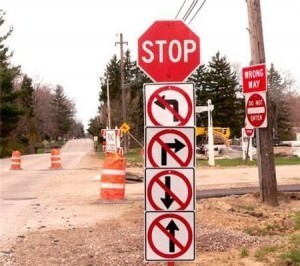
image courtesy of photobucket.com
I have a friend who’s gotten lost so often and so bad that he thinks it’s his lot in life. Not just lost trying to get from point A to point B, either. Lost as in trying to do the right thing and be the right person but somehow ending up doing and being the opposite. He says God hates him for this. He’s damaged goods now.Me, I think we sometimes underestimate just how easy it is to lose our way in life. And, like my friend, we lead ourselves to believe that only bad people get lost. So if we’re lost, we’re bad.
And if we’re bad, then God doesn’t want us. Can’t use us, either. So the best we can do if we ever wander off the path is to try and find out way back and then just stumble along, heads down, in defeat.
But I don’t think so.
The great thing about the Bible isn’t just that it’s the word of God, but that it gives an honest portrayal of the people in it. And a quick look at the giants of both the Old and New Testaments tells us that people got lost back then, too. Adam and Eve got lost. So did Moses. David was called a man after God’s own heart, and he still got lost. Paul was lost before finding the Damascus road. Peter and John? Lost, too.
It happens. To all of us. No one is exempt.
Unusable? To God there is no such thing as unusable. We can all be used by Him, regardless of what we’ve done or what we haven’t. David committed unspeakable acts. God still loved him. Paul murdered thousands of Christians, but God still used him as the voice to speak to us all.
And damaged goods? Hey, we’re all damaged goods. There isn’t anyone alive who lives to his or her truest potential, who says and thinks and does exactly what is right and nothing else. Even Paul, that murderer reformed who was touched by the hand of God, fought daily with himself over what he should do and what he does anyway.
Yes, we’ll all get lost. We’ll take many wrong turns and end up in many places we’re not supposed to be. And we will hurt and suffer because of it.
But know this: the love and power of God is such that He will use every one of our wrong turns to bring us to the right place.
Share and Enjoy:

April 19, 2012
The future tree
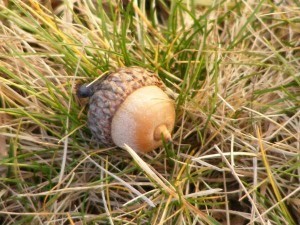
image courtesy of photobucket.com
There is an acorn on my son’s bedside table. Found by the two of us on a Sunday afternoon walk through the backyard.
That acorn is special to him. He now has inside knowledge that he formerly did not. He is privy to the acorn’s secret.
Which is this: There is a tree inside it.
Before, my son didn’t really know the true purpose of an acorn. He once saw a cat narrowly escape a falling acorn and surmised it was the tree’s method of self defense if something got too close for comfort–tree bullets. But then on another occasion he witnessed an acorn falling for no apparent reason at all. He didn’t know what to think then.
So. Seeing as how he had found another one and seeing as how I happened to be there with him at the time:
“Daddy, what do acorns do?”
Well. Acorns are seeds, I told him. And that in the Fall they drop from the trees to the ground. If all goes well and nothing bothers it much, the acorn will grow a root. When the warm weather comes back, a tree starts to grow.
“A tree?” he wondered.
“Yes. Inside the acorn is a tree.”
It was one of those times in my son’s life when validation comes for some of his more fantastical opinions. Are their dragons and fairies and pots of gold at the ends of rainbows? Yes. There had to be. If it’s true that a giant tree lives in a tiny acorn, then those things have to be true as well.
Wonderful!
But: “What do you mean if all goes well and nothing bothers it?”
Without going into the whole biological process (which I really didn’t know), I told him in broad strokes that the acorn needs things in order to turn into a tree. Water, for one. And good soil. Sunshine, too. If it has all of those things, it will grow.
We looked around and found four more acorns scattered across the yard. Those, he said, should stay were they were. But he first one went into his pocket.
I understood. Sometimes we need small examples of larger truths.
Like that acorn, we all have something big inside us. And like that acorn, what lies there must be tended to and cared for in order to grow.
It won’t be easy. That acorn is small. We are, too. And both of us are stuck in a world where there are plenty of things determined to keep us that way.
Share and Enjoy:

April 16, 2012
The showdown

image courtes of photobucket.com
Scene One:
A father and his son are in the backyard of their home. Forty feet separate them. On the boy’s left hand is a baseball glove. In his right, a genuine imitation major league ball.
His father stands under the shade of a maple tree. In his hands is a bat made for someone a third of both his age and size. He bends down and with the bat taps the trash can lid that serves as home plate.
Both have done this many times. Baseball is the boy’s favorite thing to play. The father’s, too.
The boy looks in for the imaginary catcher’s sign. Fastball. He has thrown many fastballs to his father, and his father has hit them all. Hard. (Far, too. Once over the willow and into the garden in the neighbor’s yard. A mighty wallop.) The son knows that nowhere in the history of the universe has there ever been a better striker of the ball than his father.
But.
The impossible is in the process of happening. The son has thrown two pitches that his father has swung and missed. Amazing! How is this possible? the boy wonders. Surely his father’s skills have not deteriorated. Just a few moments ago he had tossed a ball into the air and hit it even farther than the neighbor’s garden. And he wasn’t even trying.
Could it be, then, that the son is becoming just as good his father? And maybe just a tad better? Is such a thing possible?
He doesn’t know. But he knows that he will soon find out. He has one more fastball to throw, and if he throws it hard and true enough, he will do the unthinkable: he will strike out his father.
He winds and throws. The father, intensity on his face, steps into the ball and swings from his heels. The ball zooms past him and into the soft grass behind.
The son has done it. For the first time, he has beaten his father. He throws his glove into the air in celebration.
Scene two:
Ten years later.
Son and father are again in the backyard. This time, it is the father who is pitching and the son who is at bat. The father is older now. His shoulder hurts and his face is sweating. The son is older, too. And stronger. And taller. He’s been playing baseball a long time and gotten pretty good at it.
But.
The father still has a thing or two to teach his son. He isn’t as old and washed up as some may think. Because the impossible is in the process of happening. He has just gotten two strikes on this hotshot kid. One more and he reclaims his rightful title of Better Player. He winds and throws, the ball sailing out of his hand toward a different trash can home plate.
While the ball is in the air, the son remembers that day long ago when he struck his father out. He’s learned a thing or two in the meantime as well. Things like pride and accomplishment. Things like having to hang on to some things and having to let go of others.
He’s learned, too, the truth about that day.
His father didn’t just swing and miss. He swung and missed on purpose.
Just like the son had missed those first two pitches just now from his father. And just like he misses the third one, too.
The father smiles at his son. “Don’t ever think you’re better than your old man,” he says.
***
True stories, both of them. And I can vouch for that fact. Because, you see, I was the boy in both of those scenes.
I remembered all of this the other day as my own son and I were playing in our own backyard. I was batting. He was pitching. And for the first time, my son struck me out. He threw his glove into the air and whooped just like I once did.
As I stood there, feigning anger and defeat, I saw myself in him and my father in me. It was a powerful moment. For the both of us.
But I could see, too, that on some faraway tomorrow my son swinging and missing on some feeble pitch thrown by his father, allowing me to reclaim a bit of youth that time and age had taken away.
Such are the gifts we bestow to our children and our parents. Over and over.
***
This post is part of the One Word at a Time Blog Carnival: Approved, hosted by my friend Peter Pollock. To read more on the topic, please visit him at PeterPollock.com
Share and Enjoy:

April 12, 2012
The game of life
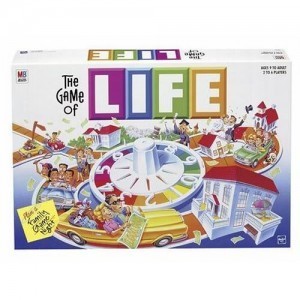
image courtesy of photobucket.com
Work at a college around a bunch of teens and twenty-somethings long enough, and you will begin to ask yourself some questions. “How can anyone wear flip-flops in December?” is one. “They actually call that music?” is another. And then there is the biggie:
“Was I really that stupid when I was their age?”
The answer, of course, is yes. Absolutely.
For instance. When I was twenty, I believed:
That life was simple.
That the future was set in stone.
That love was all I needed.
That there is good and there is bad and there is nothing else.
That faith would make everything better.
That the young had more to offer than the old.
That the new held more promise than the tried and true.
Nineteen years have passed since then. Nineteen very long, very frantic, and at times very painful years. Whichever of the above beliefs were not proven ill-conceived through marriage and children have certainly been proven so through experience. I know better now. Much, much better.
For instance.
I know that life is not simple. It is hard and scary and tiresome, but it is not simple. If you think it is, then you’re not really living it.
I know that the future may well be set in God’s eyes, but it certainly isn’t in mine. What happens tomorrow is most often a direct result of what I do today, which is most often a direct result of what I did yesterday. The choices I make this day, this second, reach further and deeper than I can possibly realize. Every moment is a defining moment. Every moment is a moment of truth.
I know that love is not all I need. I know that without such things as grace and forgiveness and effort love will crumble upon itself. Love is not the all-powerful cure that poets and dreamers have crafted it to be. It must be nurtured and fed and tended to. Love is not a firm rock that can withstand anything. It is a delicate rose that can wither without attention.
I know that there is good and bad. But I also know that there is more, and I need to look no further than my own heart for proof. For there resides the good man I could be, the flawed man that I am, and the man who must choose daily which he will become.
I know that faith alone is feeble, that only when it is polished with action does it truly shine. Too many times I have prayed for things to get better but did nothing to make them so. God may move mountains, but that’s because mountains can’t move themselves.
I know that the vigor and strength of youth may power society, but it’s experience that drives it. Life has rules, and unfortunately they are not given all at once, but bit by bit as we go. That’s why parents and grandparents are so important. They’ve been there. And because they have, they know a lot more than we do. Time changes. The times do not.
And lastly, I know the new may be exciting, may be revolutionary, may even be promising, but I also know they may not be that way for long. The very things that have sustained us in the past are the things that guarantee us a bright future, things like the importance of family and God, things like the virtues of kindness and loyalty and forgiveness. Such things are woven into us. They are the foundation of who we are and who we will become.
That’s what I know now. Will those beliefs change? Maybe. Check back in twenty years and I’ll let you know.
Share and Enjoy:

April 9, 2012
The Confident Writer
 I found the gift when I walked upstairs over the weekend to begin this piece. Sitting here on my desk waiting for me, propped up against my notebook and held in place by my pen.
I found the gift when I walked upstairs over the weekend to begin this piece. Sitting here on my desk waiting for me, propped up against my notebook and held in place by my pen.
I flipped on the desk lamp and settled into my chair, then unfolded the piece of paper. The neat, balloon-like words of half script and half cursive seemed to reach out and peck me on the cheek:
Surprise!
Don't work yourself too hard tonight! I found this book in the attic. I wondered if you ever saw it or read it. I'm pretty sure you need it since you are almost officially an author now. Just as a heads up it looks like a really old book. Some of the pages fell out. I stuffed them back in there. It's the Second Edition. I wonder if you have the First Edition. Anyway you might need it sometime. Remember don't stay up too late and again don't work yourself too hard. I Love You!!!
The word "love" had been written again at the bottom of the page in a ten-year-old's attempt at Elizabethan flourish. My daughter had signed her name below that and added a pencil-drawn heart beside it.
Beneath the letter was the treasure she had rooted out from the attic—an ancient grammar book, the origins of which escaped me. I noticed the font of the cover mimicked the "love" she used for her complimentary close. I ran a finger over the title—The Confident Writer.
That my daughter managed not only to find the book but write this letter, place it here for me to find, and then sneak back downstairs without spoiling the surprise is a testament to her resourcefulness. Also to her understanding of her father. I sat the paper aside and turned my attention to the book. After all, she was right. I may indeed need it.
It was all there in those 525 pages—nouns and verbs and sentence structure. Punctuation and prepositions. Referential words and phrases. Everything anyone would ever need in order to become an "official author."
Most everything, anyway. Because while all the nuts and bolts of proper writing were there in abundance, the most important things were not.
It's said that writers are a notoriously fragile lot, given to fits of everything from low self-esteem to a worry that borders on paranoia. I won't say that's all completely true, but it's not completely false. There are a great many rewards that can come by living your life from the inside out and scribbling down what you find along the way. But there are drawbacks, too. Every profession has its hazards, myriad ways to be banged up and injured and sickened. The only difference between writers and most everyone else is that our welts and abrasions lie hidden beneath the skin. They're visible, but only to us and only when viewed through the nearest mirror.
That is why we look for comfort wherever we can and lean upon our loved ones and those who work for our success. Small acts such as my daughter's note beside me become life preservers of sorts, something to tether us to a safe harbor and keep us from drifting into murky waters. To accept them and then offer your own small acts in return is all the proof you need that putting pen to paper may at times be an exercise in isolation, but never in loneliness. That, I think, is how a confident writer it made.
And that is why I'm setting the book in front of me aside. It won't go back into the attic, but neither will it stay on my desk. It will instead remain close at hand, ready to offer another nut or bolt to whatever story I build.
This letter, though.
That stays here. Right here next to me, where my eyes can wander to it. Where my lamp can cast its glow upon these balloon-like words and I can trace this pencil-drawn heart with a finger.
Share and Enjoy:

April 4, 2012
Love upside down
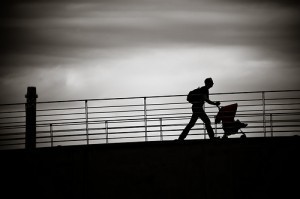
Image by Stefano Corso. Used with permission. Sourced via Flickr.
He sits beside me and tries to rein in all sixty-three of his jittery pounds, his brown hair uncharacteristically tamed save for the Alfalfa-like rooster tail, his dark eyes dancing about for a clock that isn't there. He lifts his head to my ear and whispers, "How much longer?"
Not long, I tell him, and then I remind him it's Easter and that Easter is an Important Day. On such occasions, preachers are generally inspired to preach a little more.
He nods and resumes his twitching, pulling at new khaki pants he does not like and then tugging at a clip-on tie he likes even less. My son understands Important Days, he just doesn't get why he has to dress so fancy when they come along.
The congregation stands to sing. He welcomes this as an opportunity to stretch his legs and climbs atop the pew, his tiny hands clutching my shoulder lest he tumble. The voice in my ear is high and clear. My son knows this song well, standing on his tiptoes to nails the UP, then on to say how it was from the grave He arose, with a mighty triumph o'er his foes…
I'm writing over at The High Calling Today. Won't you hop on over there and read?
Share and Enjoy:




